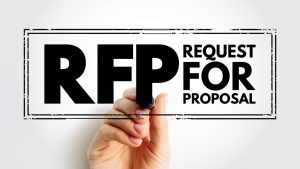The goal for government, or the private sector for that matter, is to attract as many qualified bidders on every RFP to ensure the best possible price in the current market conditions.
The goal is not to bulletproof your RFP to make it more difficult to bid. It is however, to try and capture all the pertinent information that will allow all qualified vendors and contractors to submit a proposal.
The RFP process allows a more flexible approach to procurement which opens the competition to a range of considerations beyond pure price.
For several decades, I have been working with governments and private sector companies to help them write RFPs that will attract bidders and not frustrate them with extensive non-relevant requirements that creates a situation where they do not bid the project.
The RFP process constitutes the contractual recognition of the reality that one-size-rarely-fits-all. From this concept it follows, that unless there is a meaningful distinction between the goods and services offered by one supplier of a given kind in contrast to another, the proper route to follow is an RFP.
Complicating matters is the fact few goods and services are fully fungible. It is almost always possible to identify some unique feature of the goods or services offered by each supplier.
The critical obligation of the purchasing manager is to confirm there is a rational basis for making such differentiation among prospective suppliers given the range of users to which the municipality intends to use the goods and services in question.
When I write RFPs, my goal is to outline a general performance requirement (or service need) and then leave it to the suppliers to propose solutions that will fulfill that requirement.
Suppliers and contractors are asked to explain how their goods and services will allow those performance requirements to be satisfied.
In addition, a range of “soft” evaluation criteria may also be incorporated into the evaluation process, such as experience, reputation and the like.
As a result, the proposals received have a much wider window of access. There are not narrowly defined specifications that must be matched exactly to generate a compliant bid. Price is not excluded from consideration, but since the premise of fungibility does not apply, price is not the sole criteria of reference.
A professionally written RFP will attract the most qualified bidders as well as the best possible price and service depending on the market conditions at the time. A poorly written RFP will do the exact opposite.
The difference between well written RFPs and poorly written ones can be as much as a 20 per cent difference in the overall proposal price, success and execution in the efficiency of the project.
Working with municipalities over the years I have seen poorly written RFPs that attracted no bids because of the way they were written. After a complete rewrite they went on to (in some cases) attract six bidders and ended up with not only an enormous cost savings from the original budget, but also a reduction of time to complete the project.
The biggest mistake made in this process is the attempt to bulletproof the RFPs to cover every possible risk factor. This will always substantially increase the cost of the project.
The appropriate amount of risk factors is necessary for sure, however, every bit of unnecessary risk additions you request, will increase every aspect of the bid in a negative way.
I would suggest you engage someone that has vast experience in writing RFPs to make sure you have all the areas of the proposal covered and not add requirements that only serve to confuse the bidders and add to the cost.
For a municipality, or a private sector company, this is the fastest way to save money and get the desired result for a successful project.
Stephen Bauld is a government procurement expert and can be reached at swbauld@purchasingci.com. Some of his columns may contain excerpts from The Municipal Procurement Handbook published by Butterworths.




Recent Comments
comments for this post are closed